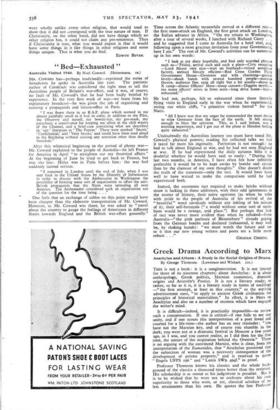"Bed—Exhausted
Australla Visited 1940. By Noel Coward. (Heinemann. IL) MR. COWARD has—perhaps inadvisedly—reprinted the series of broadcasts he spoke in Australia last year. The patriotic author of Cavalcade was considered the right man to tell the Australian people of Britain's war-effort, and it was, of course, no fault of Mr. Coward's that he had been badly briefed by experience. In the very first week of war—we learn from his explanatory broadcast—he was given the job of organising and running a propaganda and liaison-office in Paris.
"I was flown there in an R.A.F. plane which seemed to me almost painfully small as it had to carry, in addition to the Pilot, the Observer and myself, my bowler-hat, my gas-mask, my parachute, a contrivance for keeping me afloat in the chill waters of the Channel, and a brief-case containing what are described in spy' literature as 'The Papers.' These were marked Secret,' 'Confidential,' and 'Very Secret,' and could have been read aloud in the Reichstag without causing any sensation other than deadly boredom."
After this whimsical beginning to the period of phony war— Mr. Coward explained to the people of Australia—he left France for America in April "to straighten out my theatrical affairs." At the beginning of June he tried to get back to France, but was too late : Hitler was in Paris before him : the war had suddenly turned serious.
"I remained in London until the end of July, when I was sent back to the United States by the Ministry of Information in order to discuss with the Ambassador in Washington the possibility of forming some sort of organisation to offset the anti- British propaganda that the Nazis were spreading all over America. The Ambassador considered such an organisation out of the question for the time being. . . ."
One feels that an exchange of cables on this point would have been cheaper than the elaborate transportation of Mr. Coward. However, as Mr. Coward was there, he was asked to "travel about the country to gauge the feelings of Americans in different States towards England and the British war-effort generally." Time across the Atlantic meanwhile moved at a different rate__ the first mass-attack on England, the first great attack on London, the Italian advance in Africa. "On my return to Washington, after a tour of several weeks, I lunched with Richard Casey . . and he suggested that I come to Australia for a brief visit, and, following upon a most gracious invitation from your Government, here I am." The rest of Mr. Coward's activities can be summed up in his own words:
"I look at my diary hopefully, and find only scurried phrases such as—' Friday, arrival such and such a place—Civic reception —Lord Mayor very nice—wart on forehead—visited aeroplane factory, seemed fiercely efficient—Red Cross Garden Party Government House—Governor and wife charming—garden lovely—shook hands with several hundred people—matinee theatre, audience fine, sang all right but a bit woolly—drove to X camp—dinner Officers' Mess—troop concert—Diggers terrific— too many officers' wives in front seats—long drive home—bed--- exhausted.'"
He had not, perhaps, felt so exhausted since those literally flying visits to England early in the war when he experienced, seeing our white cliffs, "a primitive violent hatred" for the Nazis.
"All I knew was that my anger far transcended the mere desire to wipe Germany from the face of the earth. It felt strong enough to blast the universe. This, as I said before, was a startling experience, and I got out of the plane at Hendon feeling quite exhausted."
Undoubtedly the Australian journey too must have taxed Mr. Coward's physical powers; reading his collected talks we feel it taxed far more his ingenuity. Patriotism is not enough he had to talk about England at war, and he had not seen England at war. If he had experienced the daily autumn blitz it is doubtful whether he would have said so easily : "During the last two months, in America, I have often felt how infinitely preferable it would be to be kept awake by bombs and syrens than by the clamour of my own thoughts." One doesn't doubt the truth of the statement—only the tact. It would have been well to have waited to make the comparison until he had experienced both.
Indeed, the enormous tact required to make bricks without straw is lacking in these addresses, with their odd ignorances in the matter of history, their naive egotisms (as when he talks with pride to the people of Australia of his revival of the "beautiful" word cavalcade without any inkling of his misuse of it), their self-betrayals (" a world without some sort of snob- bism would be a strange, arid place.") But perhaps that lack of tact was never more evident than when he rebuked—from Australia—" the pink parlours of Bloomsbury" already gaping from the German bombs and declared (exhausted, it may well be, by shaking hands): "we must watch the future and see to it that our new young writers and poets are a little more robust . . ."
GRAHAM GREENE.






























 Previous page
Previous page